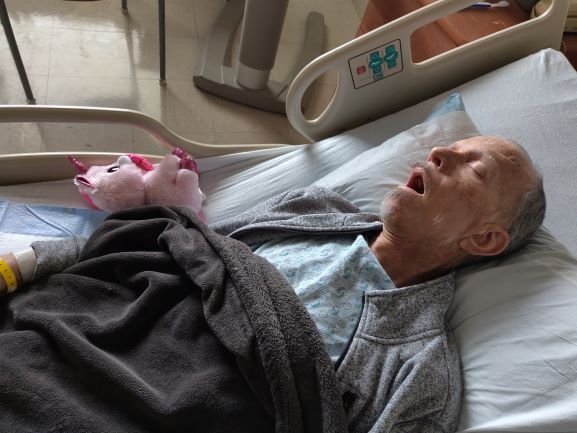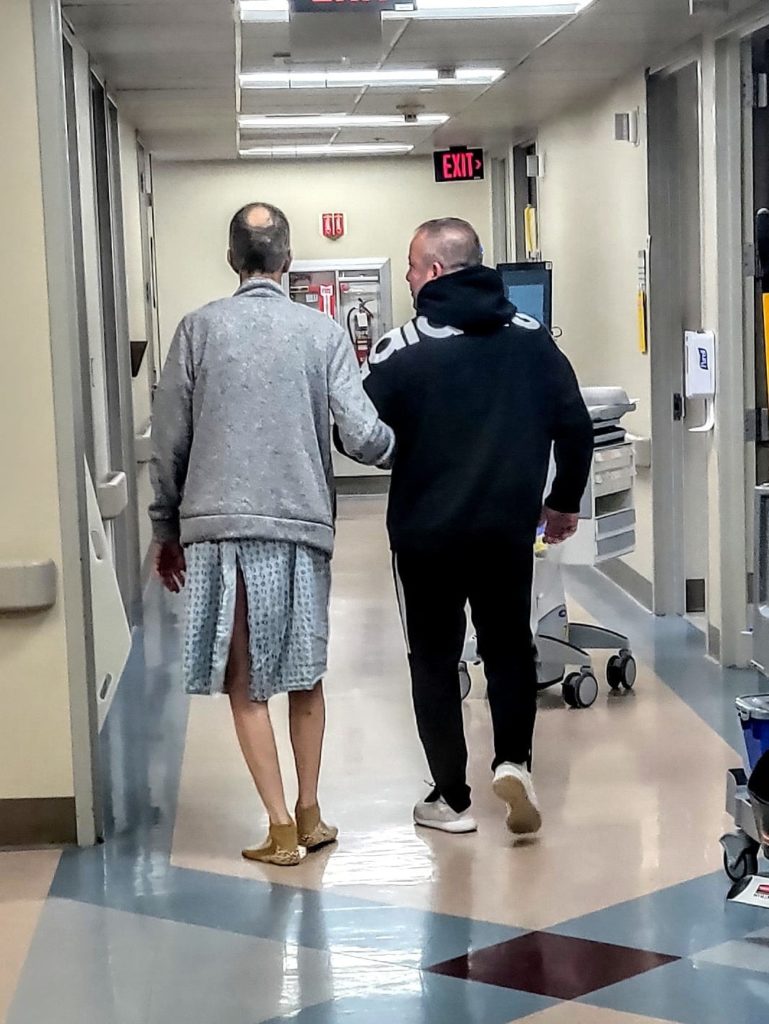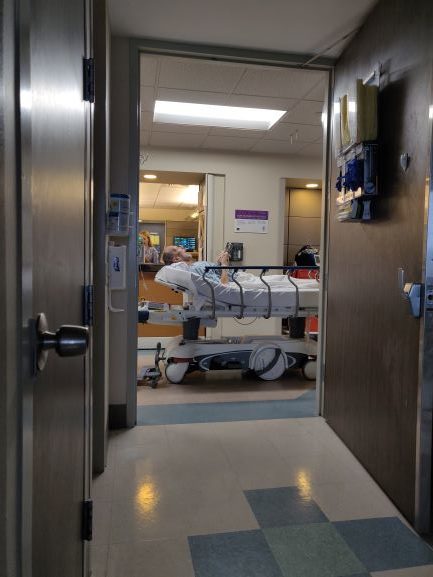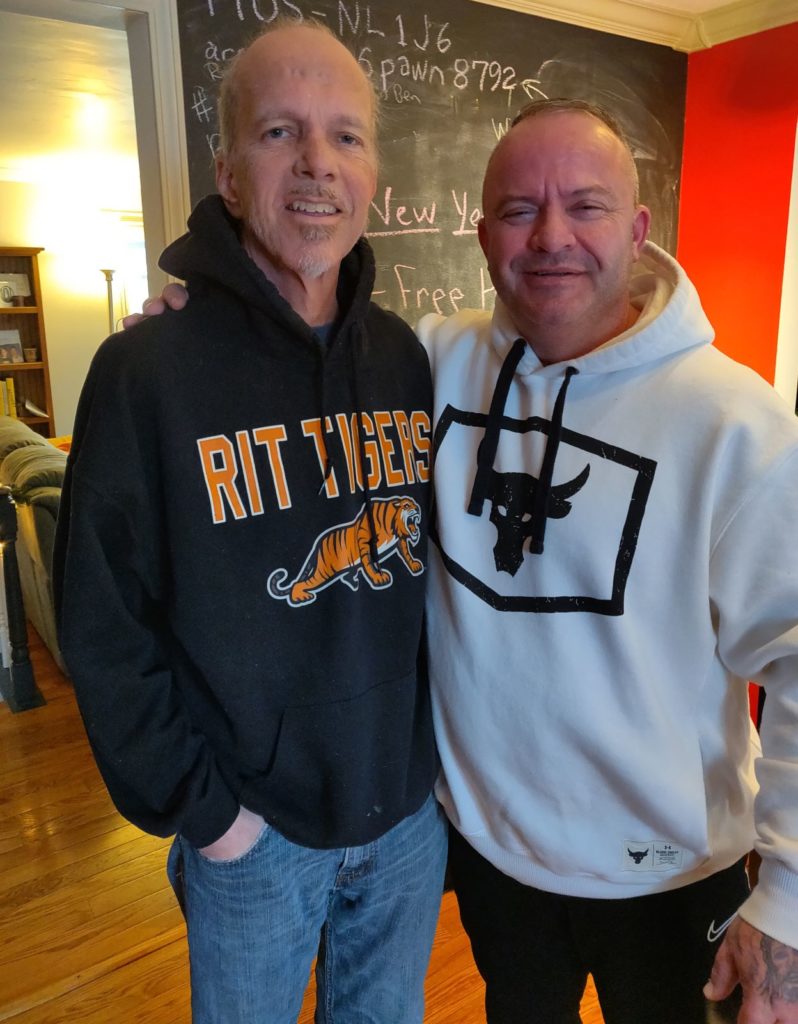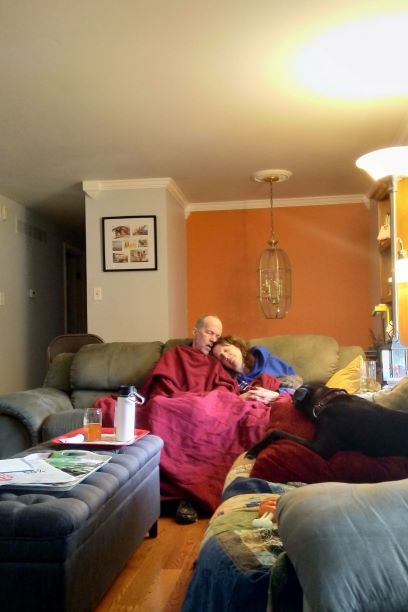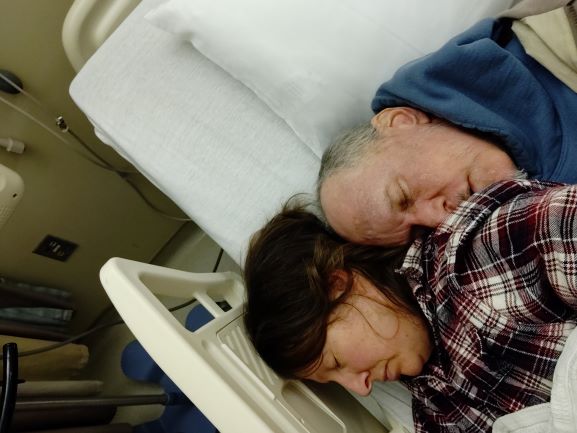
For two hours, my Valentine’s Day included Mark. During the morning hours before I arrived, Mark worked with speech, occupational, and physical therapy. Bobby wants to be ready to coach Mark at home, so he’s been joining him at the rehab a few days a week. Bobby updates me on what I’ve missed. The occupational therapist had presented Mark with cards with images of danger. For each, she asked Mark what he would do if he encountered the situation. “Like a fire?” I asked. “Nah,” Bobby reported, “Like an area rug.” In physical therapy, Mark worked on going up and down stairs and walking with less support. In his dysphagia eating group, Mark did not throw up breakfast directly onto his tray, as he had the previous two days. He was advanced from a full liquid diet to “mechanical soft foods:” chopped-up this and that, soft-cooked vegetables. When I arrived, he was dead asleep from all the effort. I put his unopened Valentine’s Day card on the bedside table, crawled into the hospital bed with him, and quickly fell asleep.
I start back to work tomorrow, having used the amount of FMLA that I am willing to at this point. I am hoarding the remaining weeks in case Mark needs me more at another time this year. It could happen. I love teaching, and I look forward to normalizing my life. But I feel anxious about returning to the bright, loud world of laughter and learning. I’m out of practice of “normal life” away from beeping machines and wheezing sinuses. I’m also trying to prepare for the “how’s Mark” questions. I’m testing out: “He took a dip in January, and then another in February, and now he’s slowly getting stronger.” I think this is a kinder approach rather than the more descriptive reality: “He’s in an acute rehab hospital, in a wheelchair, in disposable hospital briefs, with a feeding tube. He can’t see well, hear well, or reliably hold a thought in his head.” I could try giving an illustrative example. “Last Friday, the speech therapist asked Mark to name a word that starts with the letter A. Silence. She prompted, ‘How about a fruit that starts with A?’ Nothing.” But this is an incomplete picture, because sometimes Mark is witty and present. When my parents visited last week, they noticed pictures of Matthew and Ben on Mark’s bulletin board, but not Michael. “Where’s Michael’?” they asked him. “They are all among the missing,” he replied. The kind people I work with will inevitably ask me how I am doing, with a concerned and sincere little wrinkle in their brows. I’m trying out a boxing metaphor. I’m from Philly — it can’t be helped: “I’m in an endless bout in which I get knocked down over and over, crawl my way back up, bloody and weak, and have to keep fighting.”
Bobby tells me that in recovery, they have a saying: “First thought wrong.” I’ll probably stick with “hanging in there.”
It is hard — very hard — to watch Mark have setbacks. The bar for wellness gets lowered ever more. More than I knew it could. He descends to some new low, and I hunker down with him, cheering him on as he takes incremental steps forward. I scrape the sides of my reserve of energy and come up with some scraps to offer. He tells me that his vision is not getting better. In fact, it has returned to closer to what it was in July when the tumor was wrapped like a viper around his optic nerves. I want to understand how he sees the world. “What’s it like?” I tried again. I’ve asked this question many times, and he usually does not answer with any clarity. This time, he seemed curious about his vision. He slowly took turns closing his right eye, then his left, looking off over my shoulder. Finally, he said his right eye sees gray shadows and shapes. His left eye can see quite well. His brain is having a hard time integrating and making use of these two fields. “Well, at least you’ve got one good eye,” I responded. And then, “This could work out for me. As I age, you will only sort of be able to see me get older!” He smiled. I wrestled down another piece of loss rattling around in my brain.
Yesterday, after letting him sleep for a while, I asked Mark if he wanted to talk a walk. My stubborn, strong, independent man silently moved from his bed to his wheelchair “to save my strength,” he said. I followed him out of the room. He pulled himself along through a combination of tiny paddling actions with his feet, supplemented by his hands inching the wheels forward. I took the tiniest, slowest steps possible to try to match his pace. We went into the dayroom where Mark eats his meals under the watchful eyes of the speech therapy team. I turned channels on the TV and found a NASA station. They showed that famous image from last year– the first ever image of a black hole. It doesn’t look like much: a black circle with an irregular glowing arc around the lower half. They explained how time and light warp around the black hole. How nothing can escape the event horizon, and if that boundary is crossed, whatever has crossed it is pulled eternally into the density and darkness in the center.
These last few weeks have pushed me to that line. When I look at Mark’s unseeing eye, or smell tissue decaying on his breath, or watch him choose the wheelchair rather than walk, I find myself getting sucked in too close to that dark center. My Mark who could do the New York Times Sunday crossword puzzle, did geometry for a living, and held the motto “I got this” proudly. I have to back away, look away, escape to a safe distance or I fear I will not be able to return.
When we first were dating, I told Mark that I wanted to be known, to be accepted for exactly who I am. We know more of each other now in so many ways, and yet we also have less. He can’t accompany me as I move through the world. He can’t share the daily stories of life with me. We can’t go to restaurants, or the movies, or for a walk in the park. The world of us is as small as the part of the couch or bed we occupy together when we sit or lay down. It’s as small as the breaths we breathe as we hold each other. The gentle boop on the nose we give each other. We have no texting, no phone calls. There are few knowing glances, few moments of shared laughter. What we have is love in our hearts, and the simplicity of being able to be next to each other. In a neurology unit, two oncology units, a skilled nursing facility, a senior living home, an infusion center, and now at an acute rehab, Mark lays in bed and waits while the world of medicine works on him. In each place, I have wedged in between the safety railing and Mark. Mark curls his cold, tired body up against mine, finds my hand to hold, and we sleep. I wake when doctors and nurses come in, push the buttons on the bed and slowly raise us up to a sitting position to talk. We’re like John and Yoko on an interminable Beds-in for Peace. Beds-in for Love.
When I left that Mark yesterday, he wanted to walk me out. He got into his wheelchair and wheeled down as far as the nurses’ station. I leaned over for a kiss goodbye. As I walked down the long hallway, I turned back once to look. He was watching me with his big, quiet, blue eyes. He raised a hand to wave as he sat watching me walk away.
